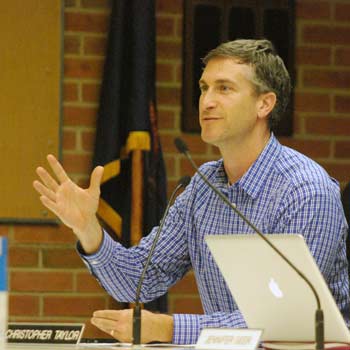Taylor Pulls Petitions to Run for Mayor
Democrat Christopher Taylor, a city councilmember who has represented Ward 3 in the city of Ann Arbor since winning election in 2008, has pulled petitions to run for mayor in 2014. According to the city clerk’s office, Taylor took out petitions early in the afternoon on Friday, Dec. 20, 2013.

Christopher Taylor, a Ward 3 Ann Arbor city councilmember, also currently serves as an ex-officio member of the city’s park advisory commission. This photo was taken at PAC’s Sept. 17, 2013 meeting.
Taylor is an attorney with Hooper Hathaway. He’s a graduate of the University of Michigan law school.
Taylor’s 2008 Democratic primary win came over incumbent Stephen Kunselman. Kunselman was then returned to the council representing Ward 3 the following year, in 2009, when he received more votes than incumbent Leigh Greden.
Ann Arbor councilmembers are elected to two-year terms. So by choosing to submit the required 250 signatures (50 from each of the city’s five wards) to run for mayor, Taylor would be choosing not to seek re-election to a fourth term on the council in 2014. According to the city clerk’s office, for the partisan primary in August 2014, petitions must be turned in by May 13 April 22.
In a press release sent to the media on Friday mid-afternoon, Taylor included an endorsement from former Ward 5 councilmember Carsten Hohnke, who is quoted as saying: “He always approaches the complex issues that come before Council by reaching out for broad input and engaging in careful analysis. His competence, collegiality and clear, balanced vision of a thriving community will serve Ann Arbor exceptionally well.” Hohnke and Taylor were both first elected to the council in 2008.
Kunselman had previously announced that he’s running for mayor. If Taylor were to prevail in a mayoral race, both men would remain on the council, because Kunselman would still represent Ward 3. Because Taylor cannot run simultaneously for a seat representing Ward 3 on the council and for mayor, that opens the door for other candidates to step forward to run to represent Ward 3.
In a telephone interview on Friday afternoon, Sabra Briere – one of two city councilmembers who represent Ward 1 – said that Taylor’s decision to run for mayor would have “no impact” on a decision as she weighs the possibility of her own mayoral candidacy. She’ll make that decision sometime in the new year, she said. [Full Story]




